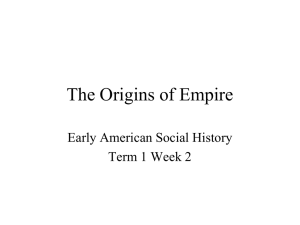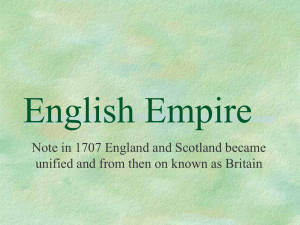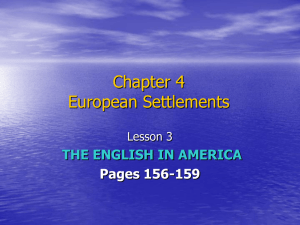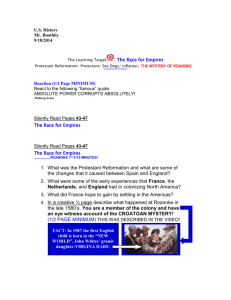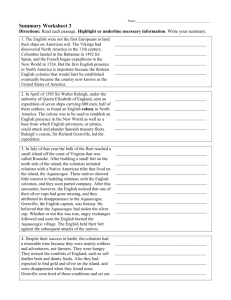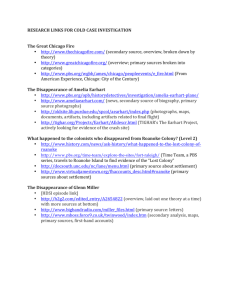The Origins of Empire Early American Social History Term 1 Week 3
advertisement
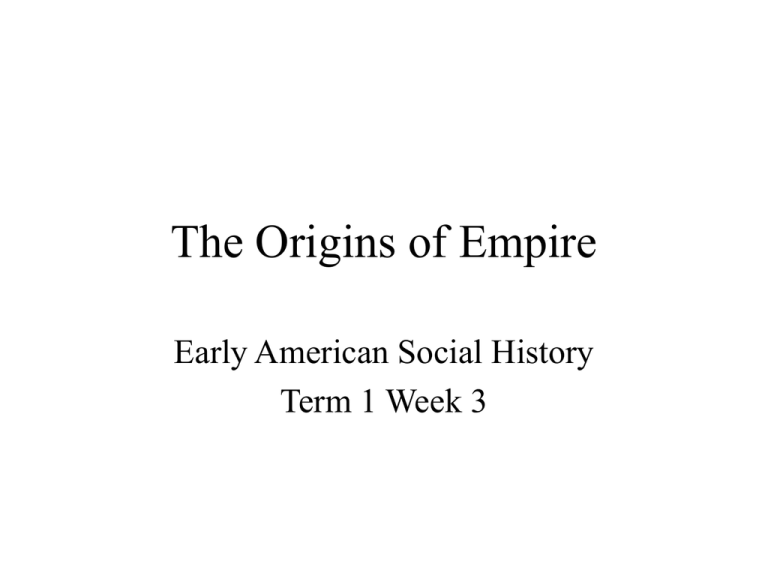
The Origins of Empire Early American Social History Term 1 Week 3 Questions • 17thC saw 1st British empire established -. 16thC therefore crucial to understanding how this Imperial mentality was created. • Why did authorities think that an overseas Empire was a good idea? • How did it manage to achieve it? • Why did the English chose America? • Why did other powers not stop the English expansion? New Era • 15thC Renaissance, encouraged new thinking about world, scientific enquiry. • Reformation challenged flat earth ideology and power of Catholic church • Ren/Ref together challenge trad social hierarchies, allow more social mobility • New era of nation state, consolidation of power into centralised monarchies, eg France, Spain, England. Age of Empires • Commercial imperatives drive voyages of discovery by Portugal into Atlantic, Africa, and India. • 1492 Spanish monarchy commission Columbus to find western route to Indies. • Caribbean islands sighted Oct 14th 1492, start of regular transatlantic voyages • Rapid development of Sp empire, conquest of Mexico 1519, Peru 1533, consolidation of European territories under Charles V. • Empire gives Sp power / influence in Europe, and wealth from Americas supports European ambitions. Charles V Role of England • England weak, politically and economically in comparison to Spain. • Henry VII had sponsored John Cabot’s voyages to Canada 1497, lost interest when NW passage not discovered. • Lack of political will, and military capacity to challenge Spain before later 16thC • But- dry run for colonial expansion in Ireland Ireland • Ireland conquered by Normans, but grad lost control. Tudors show renewed interest. • Major military expeditions during Elizabethan period, led by soldiers & adventurers. • Followed up by colonisers, esp those seeking large land holdings, use of Gaelic Irish as serfs, frequent atrocities and brutality towards Irish - seen as Catholic, barbaric, sub-humans. • About 200,000 migrants from GB to Ireland 16001670, twice no. who went to America English settlement in Ireland Ireland as a blueprint • Financed by Joint Stock Companies, same as would finance American colonies and other commercial ventures eg Muscovy Co., Levant Co. • Use of promotional literature to popularise colonisation • Attitudes towards native peoples similar • Many of the individuals involved in Irish colonisation later involved in American colonisation eg Richard Grenville, Humphrey Gilbert, Walter Raleigh. English Imperial Ambitions • Motivation: envy of Sp treasure from America; wealth helped Sp become most powerful nation; English policy to break the Iberian monopoly on America due to fear that American wealth, after Henry VIII's split with Rome (1534), could be used against them. • Eng govt sanctioned privateering operations against Spanish. Capturing Sp treasure ships bringing gold & silver from New World. • By 1580 increasingly dangerous to prey on Sp shipping suggestion that American base needed. • Idea that American cols would also ease Eng reliance on southern Europe for citrus fruits, silks, and vines. • Imp of Propaganda, cf Richard Haklyut. • 1st patent to settle in America granted to Sir Humphrey Gilbert, half brother to Walter Raleigh, permitted him to settle anywhere between Florida and Northern Canada Sir Humphrey Gilbert Sir Walter Raleigh Roanoke • 3 Eng voyages to settle North America in 1580s. The first landed at Roanoke Island, North Carolina on July 13th, 1584, short lived military expedition which found that the land was suitable for both cultivation and defense, then returned home to England with 2 local Indians, Manteo & Wanchese. • 1585-6, 2nd mission under Ralph Lane, discovered Chesapeake Bay, ideal as naval base.Noted for the oil paintings of John White and the descriptions of Thomas Hariot. But, young male adventurers, with ambitions of land and wealth, not ideal colonists. (esp since no easy wealth to be had) • Indian relations deteriorated, food supply from Indians cut off - Drake arrived summer 1586, seeking re-supply, ends up providing food for colonists, eventually agrees to return them to England. Sir Francis Drake John White’s map of Virginia Roanoke Island Fort Raleigh Fort Raleigh Village of Pomeiooc The Flyer The Lost Colony • Third voyage 1587: very diff from previous ones - most colonists farmers not soldiers, & came in family groups. Clearly intended to be a permanent settlement, selfsustaining and self-reproducing. • John White = Governor, returned to England for more supplies, leaving daughter and grand-daughter, Virginia Dare, at Roanoke. • But unable to return until 1590 due to Sp Armada, since all ships diverted to defence of realm. When finally arrives, found settlement abandoned, colonists never seen again. • Most likely attacked by Indians, survivors absorbed into tribes. Importance of Roanoke • 3 voyages saw evolution of colonising thought • Roanoke originally seen as a base for privateering, then a place where valuable raw materials could be shipped to England, only third voyage aimed to settle permanently. • The lessons of Roanoke were clear: • no colony could exist without full support from mother country in terms of men and supplies for at least the first few years of existence; • clear goals were needed to give direction and purpose to the colonisation effort. • good relations with the Indians were necessary to learn the best survival techniques in the American wilderness. Conclusions • Failure of Roanoke great setback for Eng imperial ambitions. • 1600 still no permanent Eng settlement in N. America • Yet Eng had taste for colonisation, saw it was practical, possible and still thought it worthwhile & potentially profitable.
